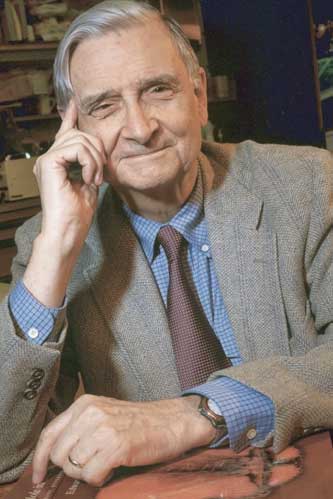“Humanity today is like a walking dreamer, caught between the fantasies of sleep and the chaos of the real world. The mind seeks but cannot find the precise place and hour.
 edward wilson
edward wilson
We have created a Star Wars civilization, with Stone Age emotions, medieval institutions, and godlike technology. We thrash about. We are terribly confused by the mere fact of our existence, and a danger to ourselves and to the rest of life.”
To be sure, this description of humanity in our time of climate change denial at the behest of self-interested material beneficiaries, environmental degradation, endless conflict, nuclear proliferation and 150 - 200 species extinctions—bird, insect, mammal and plant—every 24 hours,[1] is undeniably an accurate portrayal of 'The Human Condition'.
Wilson offers the description immediately after quoting questions—actually the title Paul Gauguin gave his masterpiece: D'où Venons Nous / Que Sommes Nous / Où Allons Nous—“Where do we come from?" "What are we?" "Where are we going?"
Gauguin determinedly, spent much of his mature years seeking answers; perhaps thinking he’d been constantly failing in this pursuit. In his masterpiece [depicted on the cover] he tries to capture and convey by his artistic conception and rendering, an approach to better understanding what he described as “ . . . our primitive soul, the imaginary consolation of our sufferings and what they contain of the value and the uncomprehending before the mystery of our origins and our future.” [Gauguin’s emphasis]
Where do answers to the evolutionary process in the life of Homo sapiens and the "human condition" reside?
Wilson considers these questions the central problem of both religion and philosophy—subjects of each tribe's creation myth! Shall we ever discover definitive answers?
His excellent and timely exposition abundantly demonstrate his unique qualification and preparedness for telling the story of this journey of discovery in search of answers. Yet, in apparent despair of our chances of success in this search, he initially remarks: "Sometimes it seems not." But continues: "Yet perhaps we can."
What follows is an extraordinarily interesting treatise filled with facts obscure to many and, for such a complex undertaking, told in a way the layperson may follow. The detailed references alone—all of 24 pages at the end of the book—are worth its price! They would also, I daresay, occupy a committed reader months, perhaps years of attention!
Accompanying images and illustrations—90 of them—deliver an often pleasing visual experience and, an undoubted hand-maiden as explanatory devices. They enable Wilson's work to illuminate further, even as it sparks controversy.
For a host of reasons controversy is to be expected, particularly as Wilson discloses scientific views on the ‘creation myth’. In an interview with Hannah Osborne [New Scientist January 28, 2015], Wilson questions the impact of religion while maintaining he’s neither atheist nor agnostic.
Unavoidably, he must contemplate religion in humanity’s search for common cause—explanations of our behaviour and environmental impact. In doing so he notes: “All the ideologies and religions have their own answers for the big questions, but these are usually bound as a dogma to some kind of tribe. Religions in particular feature supernatural elements that other tribes—other faiths—cannot accept . . . And every tribe, no matter how generous, benign, loving and charitable, nonetheless looks down on all other tribes." [emphasis added]
Referring to our ancestors—tribes of “countless thousands”—he speaks of the creation myth offering meaning to the “cycles of life and death . . . [and the fact that] . . . no tribe could long survive without the meaning of its existence defined by a creation story. The option was to weaken, dissolve, and die.”
“Since Paleolithic times each tribe—of which there have been countless thousands—invented its own creation myth. During this long dreamtime of our ancestors, supernatural beings spoke to shamans and prophets. They identified themselves to the mortals variously as God, a tribe of Gods, a divine family, the Great Spirit, the Sun, ghosts of the forebears, supreme serpents, hybrids of sundry animals, chimeras of men and beasts, omnipotent sky spiders—anything, everything that could be conjured by the dreams, hallucinogens, and fertile imaginations of the spiritual leaders . . .”
Defining creation myths as a “Darwinian device for Survival”, he highlights the fact that the “truth of each myth lived in the heart, not in the rational mind.” As a result, “mythmaking could never discover the origin and meaning of humanity.”
If neither myth nor introspection—rational inquiry—may disclose our origins, then what? If as Darwin once put it, “the brain is a citadel . . . that cannot be taken by direct assault” what tools remain?
First, there “. . . is a real creation story of humanity, and one only, and it is not a myth. It is being worked out and tested, and enriched and strengthened, step by step.” [emphasis added] Reliance on scientific advances of the last two decades give us the first pathways to figuring out the physical basis of consciousness: how and why the brain evolved the way it did.
And by the way, in the telling Wilson shatters C. P. Snow’s [1959] notion in "The Two Cultures and the Scientific Revolution", of an unbridgeable chasm of shared incomprehension—the divide that occurred between "literary intellectuals" and "natural scientists".[2]
Yet, even with insights from scientific advances, along the path of discovery, still more fundamental questions arise: “why advanced social life exists at all, and has occurred so rarely in the history of life . . . [and] what driving forces brought it into existence”. The ultimate answers require our “. . . bringing together information from multiple disciplines, ranging from molecular genetics, neuroscience, and evolutionary biology to archaeology, ecology, social psychology, and history.” [Emphasis added]
Sapiens (us) cannot claim to be the only Homo. Today’s human condition which we everlastingly seek to understand, to explain, does have an evolutionary history dating back 300,000 years to first emergence of Homo sapiens in Africa. Biology plays an important part.
Wilson breaks from the earlier notion of kin selection as the major dynamical force in human evolution to that of both kin, i.e. individual, and group selection, with all the complexity this entails. There are both individual genetic fitness and group genetic fitness properties which can, and do conflict.
The following passage explains the implications of this shift:
“The precursors of Homo sapiens, if archaeological evidence and the behavior of modern hunter-gatherers are accepted as guides, formed well organized groups that competed with each other for territory and other scarce resources. In general, it is to be expected that between-group competition affects the genetic fitness of each member (that is, the proportion of personal offspring it contributes to the group's future membership), whether up or down. A person can die or be disabled, and lose his individual genetic fitness as a result of increased group fitness during, for example, a war or under the rule of an aggressive dictatorship. If we assume that groups are approximately equal to one another in weaponry and other technology, which has been the case for most of the time among primitive societies over hundreds of thousands of years, we can expect that the outcome of between-group competition is determined largely by the details of social behavior within each group in turn. These traits are the size and tightness of the group, and the quality of communication and division of labor among its members. Such traits are heritable to some degree; in other words, variation in them is due in part to differences in genes among the members of the group, and also among the groups themselves.” [Emphasis added]
For ‘group’ substitute ‘tribe’ and consider Wilson’s observation that Tribalism is a fundamental human trait. Modern groups “. . . are psychologically equivalent to the tribes of ancient history and prehistory. As such, these groups are directly descended from the bands of primitive pre-humans. The Instinct that binds them together is the biological product of group selection.”
Here are the consequences of this evolutionary process as Wilson perceives them:
- Intense competition occurs between groups, in many circumstances including territorial aggression.
- Group composition is unstable, because of the advantage of increasing group size accruing from immigration, ideological proselytization, and conquest, pitted against the opportunities to gain advantage by usurpation within the group and fission to create new groups.
- An unavoidable and perpetual war exists between honor, virtue, and duty, the products of group selection, on one side, and selfishness, cowardice, and hypocrisy, the products of individual selection, on the other side.
- The perfecting of quick and expert reading of intention of others has been paramount in the evolution of human social behavior.
- Much of culture including especially the content of the creative arts, has arisen from the inevitable clash of individual selection and group selection.
In summary the human condition is an endemic turmoil rooted in the evolution processes that created us. The worst in our nature coexists with the best, and so it will ever be. To scrub it out, if such were possible, would make us less than human.
Now that we've come closer to an understanding of the human condition an even bigger question arises. When the assumption that all human groups are ". . . approximately equal to one another in weaponry and other technology . . . " no longer holds what's the new picture?
We may readily accept that we've " . . . created a Star Wars civilization, with Stone Age emotions, medieval institutions, and godlike technology . . . [we become] . . . a danger to ourselves and to the rest of life;" [read here: The Planet!] And for support consider that it has been more than half a century since Rachel Carson, in the book that launched the environmental movement—Silent Spring—observed:
"The history of life on earth has been a history of interaction between living things and their surroundings. To a large extent the physical form and habits of the earth’s vegetation and its animal life have been molded by the environment. Considering the whole span of earthly time, the opposite effect, in which life actually modifies its surroundings, has been relatively slight. Only within the moment of time represented by the present century has one species—man—acquired significant power to alter the nature of his world." [Emphasis added]
Yet, apart from the general and often grudging acceptance of humans' capacity to alter the nature of the planet that sustains us—including climate change — there is another, more immediate and deadly catastrophe that lurks—use of nuclear weapons! Although Wilson does not dwell on these possibilities they do come to mind. Groups, i.e. countries or States that achieve the condition of leaders in "weaponry and other technology", may start and win wars for the most immoral purposes conceivable.
In such conditions, ‘Might’, the raw, brute power of violence and warfare, may de facto, convert to ‘Right’. Ignorance and susceptibility to propagandistic manipulation becomes a state that a subgroup of key decision makers of the weaponry and technology leaders may prefer for the mass of their populations. In such a state, the worst in our nature derived from group selection—the tribal imperative—responds to depiction of the 'other' as enemy, sub-human, animal, vermin, parasites. The flourishing of an unbelievably rapid descent into the morbid and grotesque cripples the best. Yet so far, on balance, we've avoided the cataclysm.
INTERESTING DISCUSSION
Source of morality? Are there universals among human groups? Here're results of an excellent study: https://www.journals.uchicago.edu/doi/pdfplus/10.1086/701478
A brief note on ‘Darwin’ controversies
Darwin began exploration and detailed formulation of his natural selection hypothesis in 1837. He didn’t publish “On the Origin of Species by Means of Natural Selection” until 1859. These dates are agreed—accepted facts. Controversy surrounds the notion that his major reason for the 20-year wait centred on concern with objection to his sharp link between humankind and the animal kingdom. Some highlight: to the exclusion of the divine.
Stephen Gould, relying on evidence from entries in Darwin’s early notebooks, suggests “. . . he espoused but feared to expose something he perceived as far more heretical than evolution itself: philosophical materialism—the postulate that matter is the stuff of all existence and that all mental and spiritual phenomena are its by-products. No notion could be more upsetting to the deepest traditions of Western thought than the statement that mind—however complex and powerful—is simply a product of brain.”[3]
The effective idea here is that Darwin waited for an intellectual climate-shift becoming more accommodating to this revolution in thought. Fact is, Darwin in his Autobiography, described how, upon reading Thomas Malthus's “An Essay on the Principle of Population” he came upon ". . . an hypothesis by which to work. Darwin credited Malthus with having furnished him the key to his formulation of the principle of natural selection—the principle that not only transformed species but also our very understanding of life.”
Michael Ruse observes that when, “. . . telling Hooker of his evolutionism, Darwin confessed that it was like admitting to a murder. It was a murder—the purported murder of Christianity, and Darwin was not keen to be cast in this role. Hence the Essay of 1844 went unpublished.”[4]
Fact is, these issues are still subjects of debate, rather controversy and denial of scientific agreement today, as evidenced by the notion of Intelligent Design and battles in the USA Supreme Court over the teaching of evolution in science classes etc. . . .
NOTES
[1] See: https://www.theguardian.com/environment/2019/feb/10/plummeting-insect-numbers-threaten-collapse-of-nature?utm_source=pocket&utm_medium=email&utm_campaign=pockethits
[2] https://www.age-of-the-sage.org/scientist/snow_two_cultures.html
[3] Stephen Gould: "Darwin's Delay." in Ever Since Darwin (New York, Norton 1977) p. 24. SiIvan Schweber in "The Origin of the Origin Revisited," Journal of History of Biology 10 (1977) 310-315 concurs with Gruber and Gould that fear of materialism was a considerable restraining influence on Darwin.
[4]Michael Ruse: The Darwinian Revolution; (Chicago. University of Chicago Press, 1979), p. 185 Robert J. Richards: “Why Darwin Delayed, or Interesting Problems and Models, in the History of Science”; Journal of The History of the Behaviorial Sciences, January 1983.



